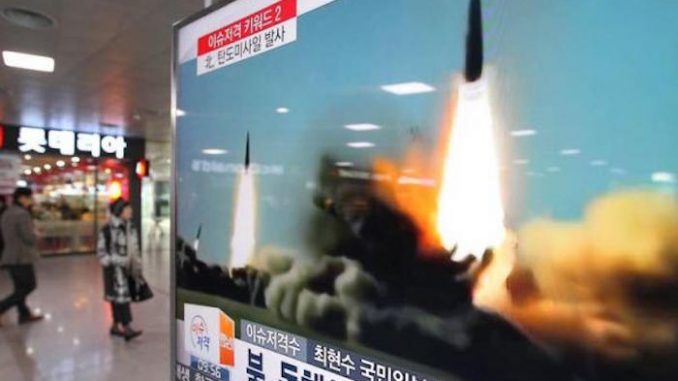
North Korea fired three ballistic missiles from the western town of Hwangju toward Japan on Monday, in a show of force just days ahead of a key anniversary.
The launches came on the final day of the G20 summit, where the president of South Korea urged China and Russia to help persuade pyongyang to end such provocations.
Yonhap News Agency reports:

BYPASS THE CENSORS
Sign up to get unfiltered news delivered straight to your inbox.
You can unsubscribe any time. By subscribing you agree to our Terms of Use
The communist regime launched the mid-range Rodong missiles from around Hwangju, North Hwanghae Province, around 12:14 p.m., a JCS official told reporters. A Rodong missile has a range of 1,300-1,500 kilometers and can strike Japanese territory.
“The three missiles all flew about 1,000 km and landed in waters some 400 km inside Japan’s air defense identification zone in the East Sea,” the official said, adding there was no pre-notice about the launch by Pyongyang.
The JCS is in the process of finding out further details about the latest provocations, he said.
The official then said North Korea appears to have test-fired the missiles to show off its missile capabilities as the summit meeting of the Group of 20 (G-20) advanced and emerging economies is under way in Hangzhou, China. The launch, moreover, took place just days before the reclusive country celebrates the anniversary of its government’s establishment on Friday.
The North’s ballistic missile launches are a clear violation of the United Nations Security Council resolutions. “We are fully prepared to fight tonight in case North Korea makes any provocative moves,” the JCS official said.
Experts say North Korea will continue to fire missiles before and after the U.S. presidential election slated for November not only to consolidate internal unity but also to secure a better position in possible six-party talks down the road.
The six-party talks, stalled since December 2008, aim to denuclearize North Korea. The six participating states are the two Koreas, the United States, China, Japan and Russia.
“North Korea looks set to beef up its missile capabilities for some time to secure a better bargaining chip in international relations by firing ballistic missiles from ground launchers and submarines,” Kim Yong-hyun who teaches North Korean studies at Dongguk University said.
But he expected the North will not conduct its fifth nuclear test in the near future as its relations with China, its closest ally, appear to have improved because of the strain between Seoul and Beijing due to the former’s decision to deploy an advanced U.S. anti-missile system by 2017.
The North’s missile launches follow the Aug. 24 test-firing of a submarine-launched ballistic missile by Pyongyang in waters off its east coast. The missile flew some 500 km towards Japan in an apparent protest against the Ulchi Freedom Guardian military drill between Seoul and Washington. The two-week command-and-control exercise ended Friday.
The North’s missile launches, meanwhile, took place a day after Seoul’s new North Korea human rights law went into effect. The law, which Pyongyang claims is subversive, aims to improve the North’s dismal human rights conditions by collecting data on the country’s human rights abuses and helping North Korean defectors reach safety.


